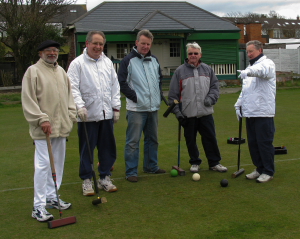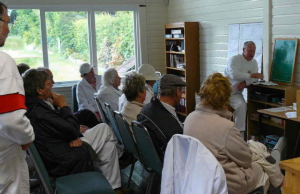Latest Update:
Details finally appeared on the CA website on 19 March: https://www.croquet.org.uk/?p=golf/gchandicapping
They have changed yet again !!!!!!!
Changes in the Golf Croquet Handicap System for 2014
Don Williamson (member of CA GC Handicap Committee) summarises new situation as at 27 February 2014
Results from play with the handicap system over the last few years have highlighted two significant problems.
- Using the present handicap system with level play games has produced a situation where the bottom level is becoming log jammed and we have a massive range of abilities on the bottom handicap.
- Using the present handicap system with handicap play produces players with much lower handicaps than those produced by level play.
The New Lower Handicaps
The first problem shows itself by the best players building up a massive handicap index above the top trigger point of 1000. The solution is quite obvious; introduce some new lower handicap levels so that the gain of points is then restricted as the top player’s handicaps will automatically fall and this is precisely what we have done.
The new handicap levels are introduced; -1, -2 and -3. They will be separated by trigger points 200 apart, setting the trigger point for -3 at 1600. It is not considered that we will need the lowest handicap but its introduction makes the handicap scale effectively open ended at the lower end and the next lower handicap is already there if required. This extension to the range will have no effect on the procedure for completing handicap cards other than an extended matrix has to be used. A copy of the new matrix is given at the end of this memo. The present matrix is still accurate for the range it covers.
It is not the committee’s intention that those with indices over 1200 will retain their present totals but that the most senior players will be allocated with new handicaps and a starting index as below:
Now -2 with index of 1400; Stephen Mulliner, Reg Bamford, Rutger Beiderwellan and William Gee
Now -1 with index of 1200; Mark Avery, Pierre Beaudry, Jacob Carr, Jeff Dawson, Harry Dodge, Martin French, James Goodbun, Howard Cheyne, Rachel Rowe, Tobi Savage and Lionel Tibble.
Any player with an index of over 1200 and not included in the above list should forward a copy of their card to the Handicap Committee as instructed at the end of this memo. All other players retain their present index and handicap.
Handicap Play Problems
These came to light whilst looking at actual handicap cards in the exercise to introduce the new handicap levels. The reason it has only recently been noticed is that it affects only a very few of our players. It is the good club player with a present handicap of 0 or 1 who plays both level play and handicap games. Unfortunately there are very few in this category. The problem is probably best understood by taking two actual examples.
A very good club player who takes part in both the national level play circuit and also plays a similar number of handicap games, managed to accumulate over 2200 handicap index points over the years. His 2013 record shows, he played 53 handicap games against opponents with the full range of handicaps, winning 45 of them and gained 370 index points. During the same period he played 68 level games and lost 76 index points. Had we introduced the new lower handicaps, his handicap would have probably fallen to -3 but then it would have been totally out of line with players of similar ability who only play level. He personally agrees his handicap on the extended system should still be 0. The lack of any lower handicaps levels managed to hide this problem.
Similarly we have another good club player who mainly plays handicap Golf Croquet in his own Federation and is not exposed to play in the national level play circuit. He has managed quite legitimately to reduce his handicap to 0 but again agrees that if he compares himself to players on the national circuit he would most likely be a 2. There is just one conclusion that can be drawn from all these figures. Players with the present low handicaps of say 0 or 1 are simply not giving away sufficient additional shots in handicap games to give a fair contest. We must therefore take steps to adjust this balance by increasing the bias against the lower handicap players. With luck this should make handicaps produced by the two formats of the game very similar.
The Solution to the Different Handicap Problems
In trying to solve this problem the Handicap Committee looked for a solution that would only have effect in handicap GC play and only where one or more players with handicaps of less than 4 were involved. Our answer was found by using a concept that has already been very successful in handicap one ball and that is what can be called “Effective Handicap” This is very simple to apply and only changes the number of additional turns that a low handicapper gives to a higher handicapper in GC handicap play, this number being equal to the difference between the two player’s effective handicaps. As all players with handicaps of 4 and above will have an Effective Handicap equal to their actual handicap, it will not affect play where no low handicapper is involved. The Effective Handicap table is given below.
| Handicap | Effective H/C | Handicap | Effective H/C |
|
3 |
2 |
0 |
-4 |
|
2 |
0 |
-1 |
-5 |
|
1 |
-2 |
-2 |
-6 |
Taking the example of our player who does not play in the level play circuit; if his handicap is increased from 0 to 2, his effective handicap will be 0 and he will still give away the same number of additional stroke and hopefully will remain stable as a 2 handicap. Our other player will retain his 0 handicap but will give away an additional 4 shots. Whether the above figures are exactly right is of course a matter for conjecture but it is a move in the right direction and a years trial will let us know whether we have gone too far or not far enough.
The Change Over Period
As with the changes caused by the introduction of the new low handicaps, we do not want players to have to spend all next season losing every game to get their handicaps in line with the new system and would advise CA Handicappers to make the step changes in the normal manner. Where handicaps have been gained almost exclusively from handicap play, the following changes should be considered.
0 H/C should become 2 with a starting index of 750, 1 H/C should become 2 with a starting index of 650; 2 H/C should become 3 with a starting index of 500; 3 H/C should become a 4 with a starting index of 475. These are suggested values and the handicapper will have to make his own judgement call if there is some content of level play. If there are specific problems, Bill Arliss has agreed to act as the senior CA Handicapper for the Handicap Committee and all details should be sent to bill.arliss@ntlworld.com.
There are in fact some very good mathematical reasons why the effective handicaps are needed to correct an obvious flaw in our old system. For the theoretically minded readers a much more detailed explanation of the changes will be included in a handicapping manual which is being prepared for our web site.
The Extended Points Exchange Matrix for Level Play
| LOSER’S Handicap | ||||||||||||||||
|
|
-3 |
-2 |
-1 |
0 |
1 |
2 |
3 |
4 |
5 |
6 |
7 |
8 |
9 |
10 |
11 |
12 |
|
-3 |
10 |
7 |
4 |
1 |
1 |
1 |
0 |
0 |
0 |
0 |
0 |
0 |
0 |
0 |
0 |
0 |
|
-2 |
14 |
10 |
6 |
2 |
1 |
1 |
1 |
1 |
1 |
0 |
0 |
0 |
0 |
0 |
0 |
0 |
|
-1 |
18 |
14 |
10 |
6 |
2 |
1 |
1 |
1 |
1 |
1 |
0 |
0 |
0 |
0 |
0 |
0 |
|
0 |
19 |
18 |
14 |
10 |
6 |
4 |
2 |
1 |
1 |
1 |
1 |
1 |
1 |
1 |
1 |
1 |
|
1 |
19 |
19 |
18 |
14 |
10 |
7 |
4 |
3 |
3 |
2 |
2 |
1 |
1 |
1 |
1 |
1 |
|
2 |
19 |
19 |
19 |
16 |
13 |
10 |
7 |
5 |
4 |
4 |
3 |
3 |
2 |
2 |
1 |
1 |
|
3 |
20 |
19 |
19 |
18 |
15 |
13 |
10 |
8 |
7 |
6 |
5 |
4 |
4 |
3 |
3 |
2 |
|
4 |
20 |
19 |
19 |
19 |
17 |
15 |
12 |
10 |
9 |
8 |
7 |
6 |
5 |
4 |
4 |
3 |
|
5 |
20 |
19 |
19 |
19 |
17 |
16 |
13 |
11 |
10 |
9 |
8 |
7 |
6 |
5 |
4 |
4 |
|
6 |
20 |
20 |
19 |
19 |
18 |
16 |
14 |
12 |
11 |
10 |
9 |
8 |
7 |
6 |
5 |
4 |
|
7 |
20 |
20 |
19 |
19 |
18 |
17 |
15 |
13 |
12 |
11 |
10 |
9 |
8 |
7 |
6 |
5 |
|
8 |
20 |
20 |
20 |
19 |
19 |
17 |
16 |
14 |
13 |
12 |
11 |
10 |
9 |
8 |
7 |
6 |
|
9 |
20 |
20 |
20 |
19 |
19 |
18 |
16 |
15 |
14 |
13 |
12 |
11 |
10 |
9 |
8 |
7 |
|
10 |
20 |
20 |
20 |
19 |
19 |
18 |
17 |
16 |
15 |
14 |
13 |
12 |
11 |
10 |
9 |
8 |
|
11 |
20 |
20 |
20 |
19 |
19 |
19 |
17 |
16 |
16 |
15 |
14 |
13 |
12 |
11 |
10 |
9 |
|
12 |
20 |
20 |
20 |
19 |
19 |
19 |
18 |
17 |
16 |
16 |
15 |
14 |
13 |
12 |
11 |
10 |


